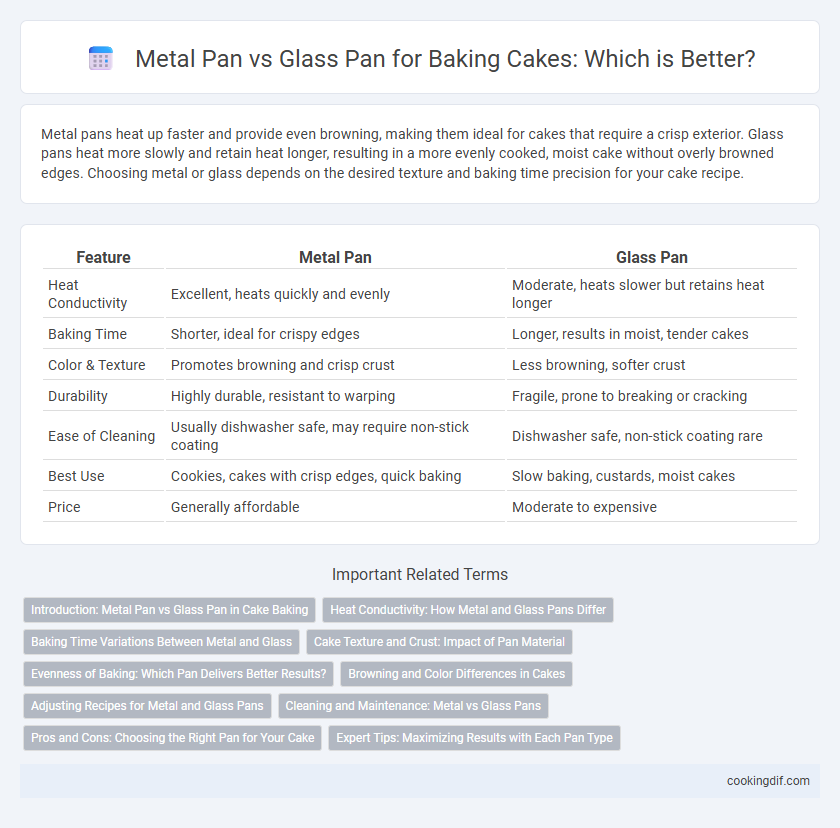Metal pans heat up faster and provide even browning, making them ideal for cakes that require a crisp exterior. Glass pans heat more slowly and retain heat longer, resulting in a more evenly cooked, moist cake without overly browned edges. Choosing metal or glass depends on the desired texture and baking time precision for your cake recipe.
Table of Comparison
| Feature | Metal Pan | Glass Pan |
|---|---|---|
| Heat Conductivity | Excellent, heats quickly and evenly | Moderate, heats slower but retains heat longer |
| Baking Time | Shorter, ideal for crispy edges | Longer, results in moist, tender cakes |
| Color & Texture | Promotes browning and crisp crust | Less browning, softer crust |
| Durability | Highly durable, resistant to warping | Fragile, prone to breaking or cracking |
| Ease of Cleaning | Usually dishwasher safe, may require non-stick coating | Dishwasher safe, non-stick coating rare |
| Best Use | Cookies, cakes with crisp edges, quick baking | Slow baking, custards, moist cakes |
| Price | Generally affordable | Moderate to expensive |
Introduction: Metal Pan vs Glass Pan in Cake Baking
Metal pans conduct heat quickly and provide even browning, making them ideal for cakes that require a crisp crust and defined edges. Glass pans heat more slowly and retain heat longer, resulting in gentler baking and moisture retention, which is beneficial for dense or delicate cakes. Choosing between metal and glass pans depends on the desired texture and baking time for the cake recipe.
Heat Conductivity: How Metal and Glass Pans Differ
Metal pans offer superior heat conductivity, allowing for even and rapid heat distribution, which results in a consistently baked cake with a well-browned crust. Glass pans, on the other hand, heat more slowly and retain heat longer, often causing slower cooking and potential over-browning at the edges. When choosing between metal and glass pans, understanding these heat conductivity differences helps achieve optimal baking outcomes based on recipe requirements.
Baking Time Variations Between Metal and Glass
Metal pans conduct heat faster than glass pans, resulting in shorter baking times by approximately 5 to 10 minutes depending on the recipe. Glass pans retain heat longer, which can cause food to continue cooking after being removed from the oven, often requiring a reduced baking temperature of 25degF. Understanding these thermal properties helps achieve consistent cake texture and prevents overbaking or underbaking.
Cake Texture and Crust: Impact of Pan Material
Metal pans conduct heat quickly and evenly, producing cakes with a well-browned, crisp crust and a moist, tender interior. Glass pans heat more slowly, resulting in cakes with a thicker, darker crust and a denser, sometimes drier texture due to prolonged heat exposure. Choosing the right pan material directly affects cake texture, crust quality, and baking time precision.
Evenness of Baking: Which Pan Delivers Better Results?
Metal pans conduct heat more efficiently than glass pans, resulting in faster and more even baking, which helps achieve a consistent golden-brown crust. Glass pans retain heat longer but heat up slower, often causing uneven cooking and potential overbaking at the edges. For recipes requiring precise, uniform baking, metal pans typically deliver better results in terms of evenness and texture.
Browning and Color Differences in Cakes
Metal pans conduct heat more efficiently, resulting in better browning and a darker, crisper crust on cakes compared to glass pans. Glass pans heat more slowly and retain heat longer, causing cakes to bake more evenly but often with lighter color and less pronounced browning. The reflective surface of glass contributes to softer edges, while metal pans enhance caramelization and Maillard reaction, influencing the cake's texture and visual appeal.
Adjusting Recipes for Metal and Glass Pans
Metal pans conduct heat more efficiently, often causing cakes to bake faster and develop a crisper crust, so recipes typically require reducing baking time or lowering oven temperature by 25degF. Glass pans heat more evenly but retain heat longer, which can result in overbaking unless the baking time is shortened or the temperature is decreased by 25degF. Adjusting recipes by monitoring doneness and making incremental changes to temperature and timing ensures optimal cake texture and prevents undercooking or burning when switching between metal and glass pans.
Cleaning and Maintenance: Metal vs Glass Pans
Metal pans typically require handwashing with mild detergent to prevent rust and preserve their non-stick coating, while glass pans are dishwasher safe and resist staining or odors. Metal pans often need seasoning or oiling to maintain their surface, whereas glass pans only require basic cleaning to remain non-porous and easy to maintain. Both materials benefit from thorough drying to avoid damage, but glass pans generally demand less frequent replacement due to their durable nature.
Pros and Cons: Choosing the Right Pan for Your Cake
Metal pans heat up quickly and provide even browning, making them ideal for cakes that require a crispy crust, but they can sometimes cause uneven baking if the heat is too high. Glass pans distribute heat more slowly and retain warmth after removal from the oven, which promotes gentle and even baking, though they may increase baking time and risk overbrowning on the edges. Choosing between metal and glass pans depends on the cake type and baking technique, with metal favored for moist, cakey textures and glass suited for delicate, evenly cooked cakes.
Expert Tips: Maximizing Results with Each Pan Type
Metal pans conduct heat more efficiently, resulting in evenly browned, crisp edges that enhance the cake's texture, making them ideal for recipes requiring a golden crust. Glass pans retain heat longer and provide gentle, consistent baking that prevents over-browning, perfect for delicate cakes and custards. Experts recommend adjusting oven temperatures by lowering 25degF when using glass pans to avoid overcooking and using lighter-colored metal pans to prevent excessive browning.
Metal Pan vs Glass Pan for baking Infographic

 cookingdif.com
cookingdif.com